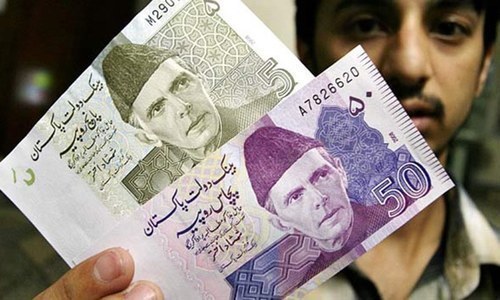KARACHI: For Pakistanis, there are many faults in our banks — unnecessary documentation for basic procedures like account opening, inordinate disruptions in digital services, arcane regimes to stifle business growth and lack of appetite to facilitate users, to name but a few.
Apparently, there is an addition to the list: exorbitant exchange rates on foreign transactions.
And as happens in times of volatility, the gap between interbank and open-market dollar rates — which is usually small — significantly widened amid high demand for the US currency. Commercial banks, insisting that they have to buy dollars from the open market to settle international payments, started charging rates that were way higher than the interbank rate.
Meanwhile, Electronic Money Institutions or EMIs — digital wallets of sorts that allow peer-to-peer transactions, top-ups and bill payments — somehow managed to offer exchange rates lower than banks.
A case in point is Ahmad Saeed, who made two foreign transactions on Jan 11, one through his bank account and another through his SadaPay wallet, which comes with a digital debit card.
Customers getting better USD-PKR exchange rate with digital wallets
On the $3.50 transaction through his bank, he was charged Rs256.5 a dollar, in addition to Rs35.91 foreign transaction fee (4pc of the total amount), Rs8.98 advanced tax, and Rs4.67 federal excise duty (FED).
In contrast, for a transaction of $4.23 on the same platform, SadaPay charged Rs255.4 per dollar, apart from Rs18.8 as FED (1.5pc foreign exchange cost + tax) and a 2pc withholding tax (with 1pc refundable to tax filers).
That day the dollar closed at Rs228.90 in the interbank market and at Rs237 in the open market.
The trick up EMI’s sleeves
Omer Salimullah, chief operating officer at SadaPay, one of the 11 EMIs that currently hold some sort of approval from the State Bank of Pakistan, told Dawn that his company did not have physical branches and used a modern technology stack, which allowed it to service customers at a cost lower than traditional banks, including a 1.5pc FX cost compared to 4pc by banks.
However, on the high exchange rate, he said the EMI didn’t buy dollars directly since it was not an authorised dealer. “We get this rate passed on by our settlement bank,” he added.
Some experts also believe that EMIs have an advantage over banks in the current scenario.
“Startups operating the EMIs have different goals. They are focused on providing better user experience and growing fast. This gives them an edge with new users in Pakistan who are mostly young and will be getting their first bank accounts,” said Mubariz Siddiqui, founding partner at the startup focused law firm Carbon Law.
The EMIs are not managing a branch network and they are also not “laden with staff”, so their cost of doing business is less, he said.
However, Mutaher Khan, co-founder of tech website Data Darbar, is not convinced with EMIs’ advantage in terms of low costs of doing business and believed that they were offering incentives to get more users.
He reasoned that being branchless was not a very significant advantage and EMIs also incurred costs to build infrastructure, get people on board and offer customer care, etc. “If it is costing something, it means someone is paying. If customers are not paying, then the company is paying.”
Besides, EMIs might have another edge over banks: capital funding. Since most EMIs are startups backed up by venture capitals, they have money to spend on such incentives, he said.
Should banks be worried?
With EMIs having a certain advantage over banks, and now five digital banks securing licences to operate, should banks be worried about losing their customers?
For Mr Khan, the current scale of EMIs’ business is insignificant to dent commercial banks. As long as banks’ deposit base is secured, they won’t be threatened, he said.
And even with the arrival of digital banks, there will be no real danger to the banks unless they start offering incentives that are way too appetising for the users.
“If digital banks start lending or offer add-ons like profit on current accounts or better rates on saving accounts, then they can disrupt traditional banks,” Mr Khan said.
For Mr Siddiqui, the arrival of new players would put existing banks under pressure and a more saturated market would lead to healthy competition.
Published in Dawn, January 23rd, 2023













































Dear visitor, the comments section is undergoing an overhaul and will return soon.